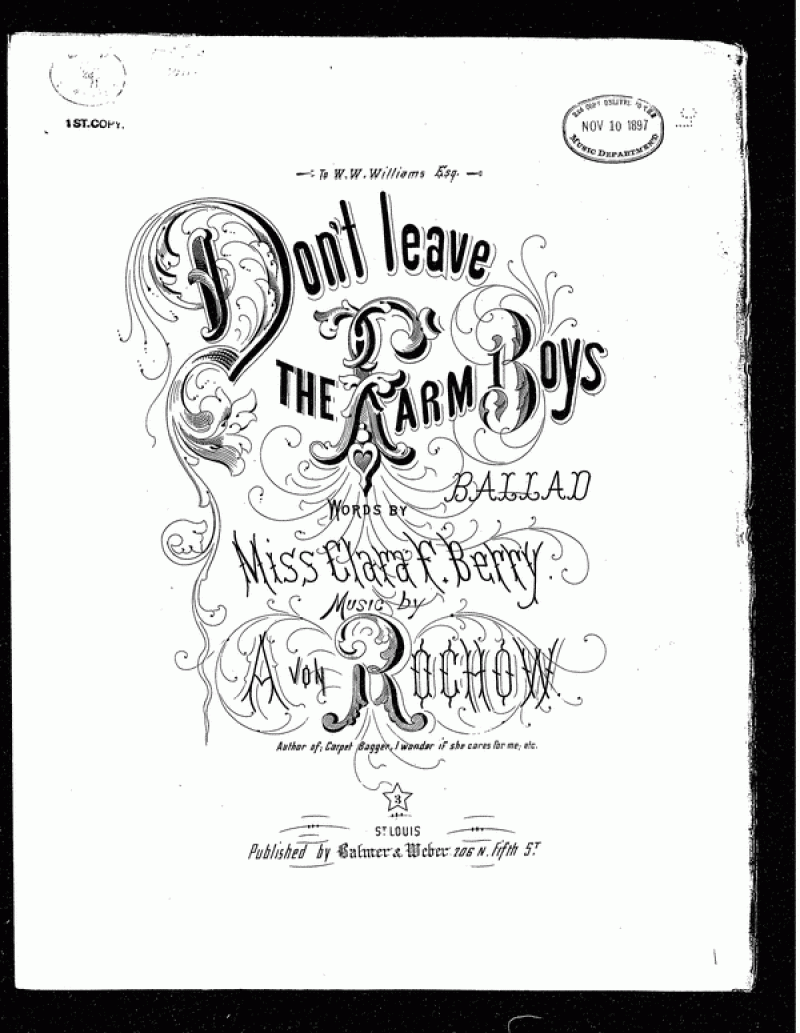Don't Leave the Farm Boys
Lesson Plan
Created by Todd Miller, Hillsdale Middle School. Special Note: For me, this song is somewhat personal since the lyrics appear in my great-great-great grandfather, David Zook’s, journal which he kept in the 1870s.

Grade Level:
8th
Duration:
One class period
Lesson Summary:
America was going through many rapid cultural, economic, and political changes after the Civil War. With improvements in transportation and the growing demand for labor because of the Industrial Revolution, cities began growing at a faster and faster rate. Not everyone was happy with these changes. This song, written by Miss Clara Berry in 1871 warns of the dangers of leaving one’s home in the country. Students will read the
File
, to analyze the source.
Standards Addressed:
1. Describe and analyze the territorial expansion of the United States including
2. Westward movement including Manifest Destiny
3. Describe and explain the social, economic and political effects of
a. stereotyping and prejudice
4. Compare places and regions in the United States as they existed prior to 1877 with the same places and regions today to analyze changes in land use and population, political, social and economic characteristics
5. Analyze how physical characteristics of the environment influenced population distribution, settlement patterns and economic activities in the United States during the 18th and 19th centuries
Primary Source:
Song, “Don’t Leave the Farm Boys” Published: St. Louis: Balmer & Weber, 1871.
Words by Clara Berry
Music by Alfred von Rochow
Instructional Steps:
Distribute the words to the song and the Questions sheet.
Students may work individually or in small groups to answer the questions.
Conclude with a class discussion of the questions.
Optional: You can download the sheet music from the Library Congress and have the class sing the song (a piano or keyboard to accompany the students would be helpful. Such accompaniment may be pre-recorded).
Follow up activities:
- Pretend that it was your father who wrote that song to you and respond to it in a letter. In your letter, tell your father that either you have decided to stay on the farm or to go seek your fortune in the world. You are to not only give him your decision, but also explain the reasons for doing so.
- The following is a passage from a letter written by Thomas Jefferson to Benjamin Rush on September 23, 1800. Do you think he would have agreed with the song? “I view great cities as pestilential to the morals, the health and the liberties of man.”
- Research the for 1790, 1800, 1810, 1820, 1830, 1840, 1850, 1860, 1870, 1880, 1890, and 1900. Look for data that shows percentages of people who lived in rural environments and urban environments. Using the data, construct pie charts for each year. When finished, compare the pie charts and explain why the differences are taking place. Then predict what the pie chart might look like today and what it might look like in the future.
- Ohio is currently suffering from a “Brain Drain.” Research what the phrase means and what causes it. What might Ohio do to prevent this from continuing to happen?
